Farmers face crisis as drought causes grass to fail
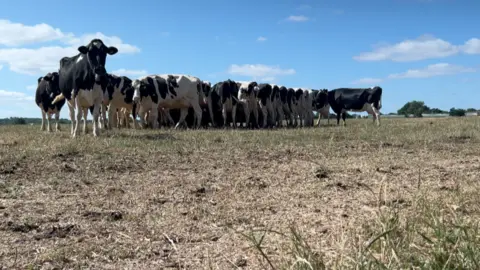 BBC
BBCDairy farmers are facing a crisis, spending thousands of pounds feeding their cattle grain that should be saved for the winter.
This year's long, dry spring - the warmest and sunniest on record - has forced many farmers to take unprecedented action.
Sarah Godwin, a dairy farmer in north Wiltshire, has had to take feed out to her cows for the first time in her life. She said she had "never known a season like this, never known the heat, the lack of rain, and for so long".
Professor Nicola Cannon from the Royal Agricultural University blamed the record dry spring, which is "warming the fastest of all seasons".
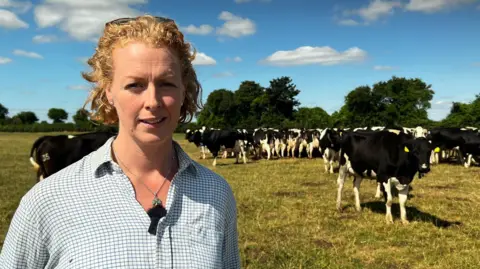
When I arrived at Mrs Godwin's family dairy farm near Chippenham, they were taking breakfast out to their cows.
Normally, like a lot of West Country dairy farms, the cows are out in the fields all summer, just grazing on rich natural pastures.
But not this year.
"The grass is completely dried up," Mrs Godwin explained.
"There's no goodness in it, it's just completely stalky with no nutritional value at all."
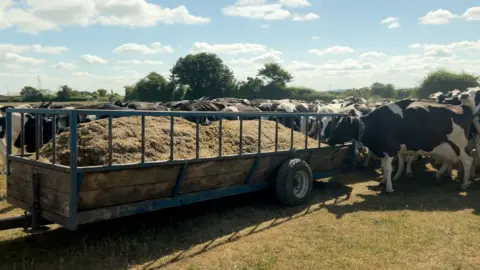
When the tractor comes through the gate, pulling a rack of rich cattle feed, the cows run alongside. They know what is coming, and they can't wait.
The rack is soon invisible, lost in a crowd of happy cows, all feasting on the perfect nutritional ration of cereals.
But they shouldn't be eating this till October at least, when the grass is gone and they come inside.
I asked Mrs Godwin if she had ever had to do this before.
"Never," she said quickly.
I have heard this is happening on dairy farms across the West Country, as the long dry spring turned into a hot summer, and the grass faded.
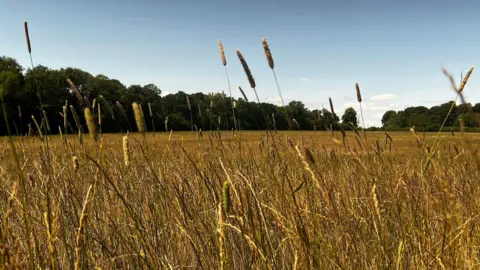
To find out exactly what is going on, I went to an experimental test field in Gloucestershire. A classic grazing meadow, fringed by beech trees.
It is tended by experts from the Royal Agricultural University, and scrutinised by Prof Cannon.
"Look at these stems," she showed me, grasping a handful of brown grass.
"If this was cut for hay, you see how there is no leaf on it?
"It's the leaf which contains the sugar, which is the tasty bit, the nutritious bit."
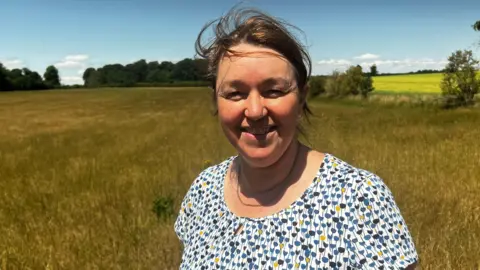
They say you should make hay while the sun shines, and farmers have been doing just that. But many have found hay that is crisp and dry, even powdery.
There just are not enough leaves on the stems.
Across Wiltshire, yields are down 50%.
The summer is now here in earnest, the Met Office has officially declared heat waves.
But it is not summer that has done the damage, it was spring.
Met Office figures show spring 2025 was the warmest and sunniest on record, and the driest since 1893.
"And spring is the most important season for plant growth," explained Prof Cannon.
"So even when the sun came, the grass can't use that energy, because it never grew properly in the first place."
Back on Mrs Godwin's farm, the cows are settling down for a nap after their healthy breakfast, unaware how the climate is changing around them.
I asked her how they will cope, how they will change in the long term.
She smiled ruefully, "I don't know Dave, maybe we should grow wine instead?"
What is climate change?
Climate change is the long-term shift in the Earth's average temperatures and weather conditions.
The world has been warming up quickly over the past 100 years or so. As a result, weather patterns are changing.
Between 2015 and 2024, global temperatures were on average around 1.28C above those of the late 19th Century, according to the European Copernicus climate service.
Since the 1980s, each decade has been warmer than the previous one, the UK Met Office says.
The year 2024 was the world's hottest on record, with climate change mainly responsible for the high temperatures.
It was also the first calendar year to surpass 1.5C of warming compared to pre-industrial levels, according to Copernicus.
Follow BBC Wiltshire on Facebook, X and Instagram. Send your story ideas to us on email or via WhatsApp on 0800 313 4630.
